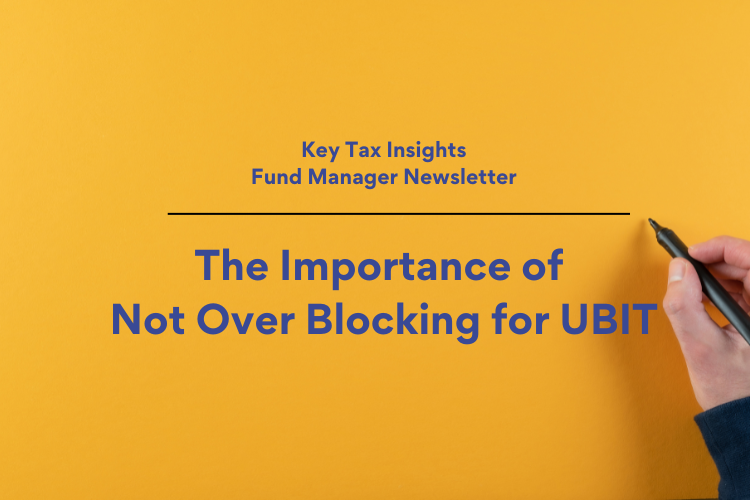Prepared by Christopher Klug - Founder, Klug Counsel PLLC. To save or read this newsletter offline, click here
Taxes play an important role in the structure of a fund. There are various categories of investors that have different tax implications which will impact the structure of a tax-efficient fund. One such group of investors are tax-exempt investors and the planning around Unrelated Business Income Tax (“UBIT”). A common planning strategy for UBIT is placing a blocker corporation in the structure. If the blocker corporation blocks more than the UBIT, the tax-exempt investors will have their investment earnings reduced unnecessarily.
We recently worked with a fund that had tax-exempt investors. The structure for the tax-exempt investors’ entire investment was through a corporate blocker. The fund itself produced UBIT which needed to be addressed in the structure. In addition to their equity investment, the tax-exempt investors were going to receive interest income which would not constitute UBIT and would not be subject to tax if held directly by the tax-exempt investors.
The Fund initially followed the structure of another fund with a similar investment model that used a blocker corporation for the entire investment of the tax-exempt investors. This resulted in both the investment earnings and interest income being subject to corporate tax at 21 percent. In planning for our client, the goals were to be tax efficient and for the investors to hold one equity investment; that is to have one equity investment that covered the tax-exempt investors’ debt and equity contribution into the fund.
The Fund was restructured by placing an investment vehicle above the corporate blocker for the tax-exempt investors to invest. This allowed for only UBIT to flow through the corporate blocker and the interest income to flow directly to the investment vehicle, thereby avoiding the 21 percent corporate income tax on the interest income. This restructuring resulted in an increase in return of more than $1.3 million to the tax-exempt investors on an annual basis.
Fund managers often have difficulty finding customized tax advice either because the big firms think they are too small to focus time on or the other options do not have the necessary experience. This results in overly simplistic structures such as the over-blocking structure discussed above. We have a unique team that allows us to work with these funds and provide customized structures where returns are not needlessly wasted on tax.
Christopher M. Klug serves clients with domestic and international taxation, tax controversy, corporate/business planning, mergers and acquisitions, cross-border transactions, and domestic and international estate planning needs.
Klug Counsel represents companies, start-ups, private equity funds, family offices, and high-net-worth individuals. Through their strategic partnerships with law firms and other professional service firms in the U.S. and around the world, they are able to meet the tax and business needs of their clients in the U.S. and internationally.
